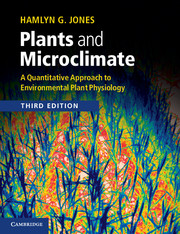Book contents
- Frontmatter
- Contents
- Preface
- Acknowledgements
- Symbols
- Main abbreviations and acronyms
- 1 A quantitative approach to plant–environment interactions
- 2 Radiation
- 3 Heat, mass and momentum transfer
- 4 Plant water relations
- 5 Energy balance and evaporation
- 6 Stomata
- 7 Photosynthesis and respiration
- 8 Light and plant development
- 9 Temperature
- 10 Drought and other abiotic stresses
- 11 Other environmental factors: wind, altitude, climate change and atmospheric pollutants
- 12 Physiology and crop yield improvement
- Appendices
- References
- Index
10 - Drought and other abiotic stresses
Published online by Cambridge University Press: 05 June 2014
- Frontmatter
- Contents
- Preface
- Acknowledgements
- Symbols
- Main abbreviations and acronyms
- 1 A quantitative approach to plant–environment interactions
- 2 Radiation
- 3 Heat, mass and momentum transfer
- 4 Plant water relations
- 5 Energy balance and evaporation
- 6 Stomata
- 7 Photosynthesis and respiration
- 8 Light and plant development
- 9 Temperature
- 10 Drought and other abiotic stresses
- 11 Other environmental factors: wind, altitude, climate change and atmospheric pollutants
- 12 Physiology and crop yield improvement
- Appendices
- References
- Index
Summary
In the previous chapter we considered temperature as one important abiotic factor affecting plant performance; in this chapter we discuss some other important environmental stresses, though concentrating on water deficits. Over large areas of the Earth's surface, lack of water is the major factor limiting plant productivity. The average primary productivity of deserts is less than 0.1 tonne ha−1 yr−1; this is at least two orders of magnitude less than the productivity achieved when water is non-limiting. Even in relatively moist climates, such as that of southern England, drought lowers the yields of crops such as barley by an average of 10 to 15% each year, while the yields of more sensitive crops such as salads and potatoes may be reduced even further if unirrigated.
There are many possible definitions of drought and aridity that range from meteorological droughts defined in terms of the length of the rainless period, through definitions that allow for the water storage capacity of the soil and the evaporative demand of the atmosphere, to those that include some aspect of plant performance. In the following, drought is used to refer to any combination of restricted water supply (e.g. as a result of low rainfall or poor soil water storage) and/or enhanced rate of water loss (resulting from high evaporative demand) that tends to reduce plant productivity.
- Type
- Chapter
- Information
- Plants and MicroclimateA Quantitative Approach to Environmental Plant Physiology, pp. 255 - 289Publisher: Cambridge University PressPrint publication year: 2013
- 7
- Cited by



